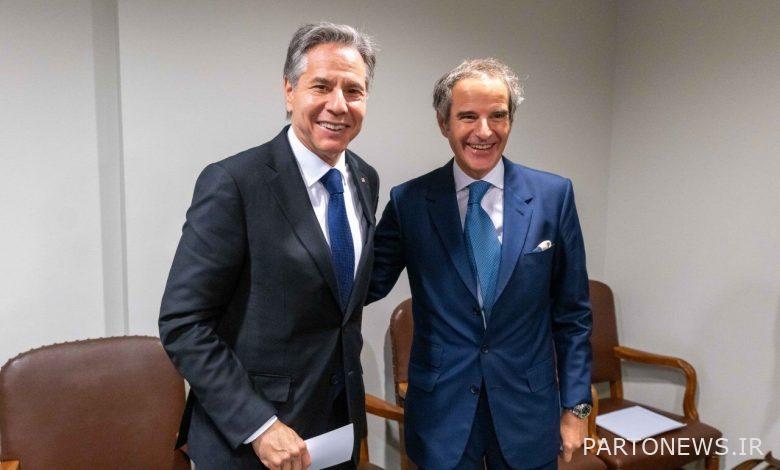US Secretary of State: I had a useful conversation with the Director General of the Atomic Energy Agency

The US foreign minister added on Monday evening local time: I had a useful conversation with Rafael Grossi, head of the International Atomic Energy Agency, on the sidelines of the NPT conference in New York.
Blinken added: The International Atomic Energy Agency plays a vital role in advancing nuclear non-proliferation, safeguards and the peaceful use of nuclear energy.
The US Secretary of State continued: We all must support the important work of the International Atomic Energy Agency.
Ned Price, the spokesperson of the US Department of State, also said that Blinken, in his meeting with the Director General of the International Atomic Energy Agency, emphasized the important cooperation between the Agency and the United States and the vital role of this institution in promoting nuclear non-proliferation, safeguards and the peaceful use of nuclear energy. He repeated again.
The director general of the International Atomic Energy Agency said: “If we want to provide credible assurances that Iran’s growing nuclear program is exclusively for peaceful purposes, we must provide the basis for cooperation and ensure inspectors have access to the nuclear programs.”
According to IRNA’s report from the website of the International Atomic Energy Agency, Rafael Grossi added at the UN Nuclear Non-Proliferation Treaty (NPT) review conference: I ask the Iranian authorities to provide complete information to the agency.
He said: The lack of progress in verifying the peaceful nature of Iran’s nuclear program will have consequences on the regional security perspective.
Grossi pointed out that the countries of the world should re-declare their adherence to this treaty (NPT) and asked the countries of the world to come together and re-commit to the principles of the NPT in promoting cooperation for the peaceful use of nuclear energy.
The Director General of the International Atomic Energy Agency said in the gathering of 180 countries present at today’s meeting: We cannot have a safer world with more nuclear weapons and building arsenals.
The US Secretary of State claimed on Monday local time at the NPT review conference at the UN headquarters in New York: Iran is still on the path of nuclear escalation.
The US foreign minister claimed without referring to his country’s political decision to return to the JCPOA and the lack of effective practical action by the Biden administration in this regard: Although this country publicly claims that it wants to return to the JCPOA, since March until now Iran He either did not want or could not accept the agreement.
Without mentioning the double policy of diplomacy and the pressure of the Biden administration, he claimed: Returning to the JCPOA is still the best result for America, Iran and the world.
The US Secretary of State also announced that North Korea is preparing for its seventh nuclear test.
At the same time as the 10th review conference of the United Nations Nuclear Non-Proliferation Treaty (NPT), the United States, France and England reiterated their claims about Iran’s peaceful nuclear program and sanctions relief talks.
According to the statement that the United States Department of State published on Monday local time under the title of its joint statement, France and England, it is claimed that we are committed to addressing the proliferation of arms throughout the world.
It is claimed in this statement: We emphasize once again that Iran should never produce nuclear weapons. We regret that despite strong diplomatic efforts, Iran has not yet used the opportunity to revive the full implementation of the JCPOA.
US President Joe Biden claimed today: Through diplomacy and in coordination with our allies and regional partners, we have put forward a proposal to ensure mutual return to the full implementation of the JCPOA to ensure that Iran does not acquire nuclear weapons.
Eight rounds of intensive negotiations between representatives of Iran and the 4+1 group in Vienna in March 1400 reached a stage where the success or failure of the talks now depends solely on the political decisions of the United States as the culprit of the current situation. If Washington takes the necessary decisions it is aware of, the few remaining issues can be resolved and a final agreement reached within days.
Joe Biden’s government, which claims a diplomatic approach towards Iran and an effort to return to the JCPOA, has so far not taken a step to show its goodwill and has applied maximum pressure to the failed policy.
American officials and Western media continue to play the blame game and insist on showing Iran as the cause of the delay in reaching the final agreement and the possible failure of the negotiations. This is while the demands of the Islamic Republic of Iran have been set with a realistic approach in accordance with the requirements of the 1994 agreement and in accordance with the experiences gained from the performance of the western parties.

